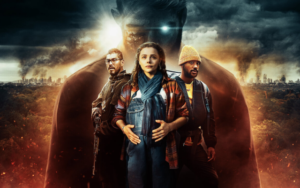MOTHER/ANDROID: 2 STARS. “short on originality and long on derivative ideas.”
 Imagine a near future where androids co-exist with people. That’s the way “Mother/Android,” the new Netflix post-apocalyptic thriller starring Chloë Grace Moretz, begins.
Imagine a near future where androids co-exist with people. That’s the way “Mother/Android,” the new Netflix post-apocalyptic thriller starring Chloë Grace Moretz, begins.
Human in appearance—think “The Terminator” but without the muscles—the droids are mostly support staff, serving drinks at parties and working as household help. All is hunky dory until the robots blow a gasket and turn on their human counterparts. “They’re not supposed to be able to do that!” shrieks one victim. “They are programmed not to be able to do that.”
We first meet Georgia (Moretz), a young pregnant woman, enjoying a Christmas party with her boyfriend Sam (Algee Smith) and some others when a robot waiter short circuits and attacks the partygoers. And the murderous bot isn’t alone; he’s part of an A.I. apocalypse happening across the country.
Jump cut to nine months later. Georgia’s baby is overdue and she and Sam, like so many others, were forced to flee from cities to the relative safety of rural military camps where electromagnetic transmitters provide protection from rampaging robots.
But it’s a losing battle. “I’m fighting a war here against an enemy that literally never sleeps,” says the camp leader.
In a last-ditch effort to find a safe place for their baby to grow up, Georgia and Sam plan to leave the United States for Korea, where the robots haven’t taken over. First though, they must traverse the dangerous No Man’s Land, the deadly wilderness between them and safe passage out of the country.
“Mother/Android” made me wonder whether a twist is still a twist if you can see it coming a mile away. No spoilers here, but as an audience we’ve seen a lot of post-apocalyptic movies in the last decade or so, and, I would guess, so has writer-director Mattson Tomlin. Much of the imagery and general idea of a folks on the run from some sort of catastrophe are familiar, and feel borrowed from other movies. The twist will be predictable to fans of the genre, adding to the movie’s generic feel.
Moretz is the best thing about “Mother/Android.” She brings a steeliness and vulnerability to Georgia’s story of resilience and survival as the movie plods around her. A third character, whose intentions are not immediately clear, appears midway (AGAIN, NO SPOILERS HERE) and spices things up a bit, but even that doesn’t get the blood pumping.
“Mother/Android” feels like the love child of “Children of Men,” “The Terminator” and “A Quiet Place” and, as such, commits the biggest sins of speculative fiction—it’s short on originality and long on derivative ideas.
